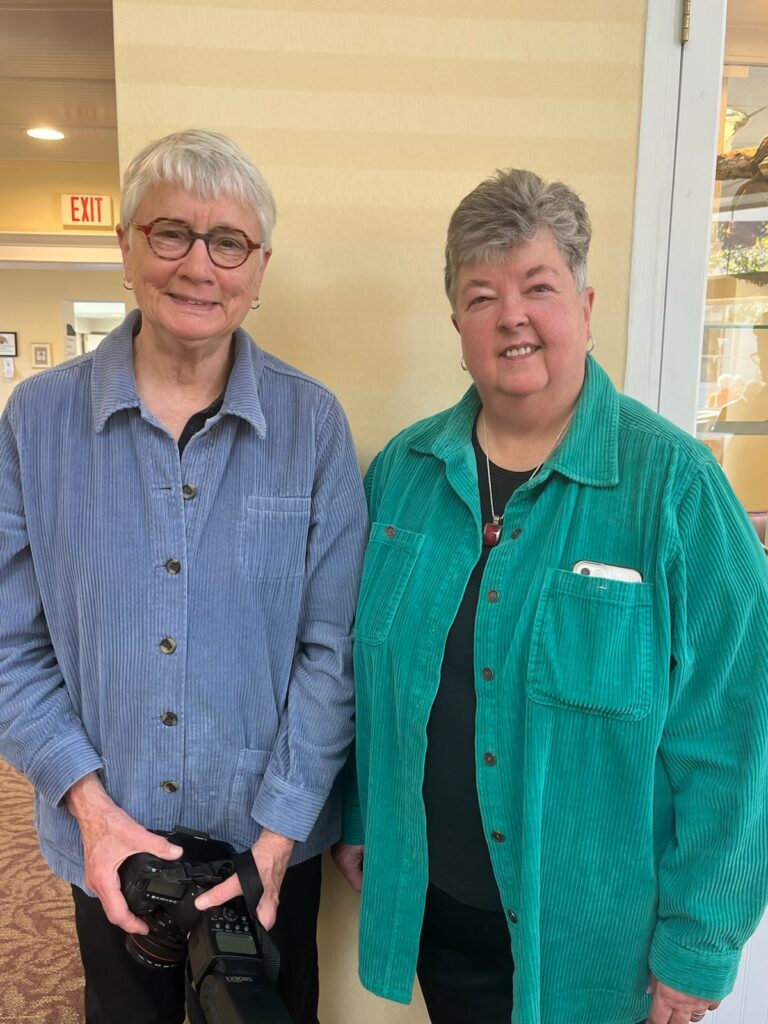
By the time Nereide Ellis and Tonda Rush met, they already had a world of experience behind them.
Though raised in Virginia, Nereide went abroad to teach, first in Australia for a year (“I looked at a map and that looked like a good place to go”) and then in the U.S. Virgin Islands. The year she arrived in the Virgin Islands in 1970 was the first year that non-U.S. citizens were allowed to go to school, “so in third grade, I had kids who were shaving.”
Eventually, Nereide returned to the States, earning both a bachelor’s and master’s degree in botany. In Arlington, Virginia, “we lived in total shade in the woods and nothing else would grow but mushrooms.” She used her mushroom expertise to establish a consulting company that encouraged people to grow their own shiitakes.
Meanwhile, Tonda, a Kansas native, pursued a degree in journalism – with occasional interruptions. “I kept dropping out either to make money or because I was going to hitchhike to California or I was tied up with the Kent State protests,” she explained. Eventually, she received her bachelor’s in journalism from the University of Kansas and worked as a reporter for a few years before returning to the University for law school.
Tonda came to Washington D.C. for an internship with a member of Congress and caught Potomac fever. “I moved to D.C. thinking that I’d stay for two or three years, then I’d go back to Kansas or somewhere else and be a newspaper reporter again. And that never happened.” Instead, she spent 30 years in journalism advocacy, including three stints as the CEO of the National Newspaper Association. She still serves as their General Counsel, though she says she has “begun to segue into retirement and I’m still working on getting there.”
The two women were introduced by a mutual friend in the late 1990s and legally married in 2015. They maintained two homes in Arlington for several years while Tonda had a teenager at home. When they moved in together, they enjoyed a home with a forest on three sides with a creek running behind them.
When they began to think about moving to a life plan community, Collington stood out in a number of ways. Looking for a place that had good walking trails, Collington’s 100-plus acres provided just the right setting. “The main thing for me is being able to walk on the paths near a creek and see all manner of things,” says Nereide. “You can go at six in the morning or 10 at night. Whatever you want to do.”
In Collington, they also found a welcoming and supportive community. “We found the people here were incredibly friendly, open and helpful,” says Tonda. “They were very accepting and eager to get us involved in anything that we were interested in.”
“We felt that from the first time we came here,” Nereide adds.
Nereide has brought her botany skills to bear in developing two plots in the Hilltop Gardens, a space on campus set aside for a community garden. Among other crops, she has harvested wax beans, squash and tomatoes to share with the community. Although her shiitake mushroom logs haven’t been able to grow now that they live in a home with full sun, Tonda shares that Nereide “stuck one sprouting potato in the ground outside our back door in March. And we’ve probably harvested about 30 pounds of potatoes from it.”
Nereide is also doing more photography, particularly of the wildlife that “seem to gravitate toward her lens,” according to Tonda. Nereide has captured photos of foxes, groundhogs, beavers, otters, and more. “We got one picture when we were trying to diagnose why our bird feeder was empty every morning from a motion sensitive camera. You can see the deer walk up in the middle of the night, empty it in their mouths and walk away.”
Nereide also regularly takes photos for the Collingtonian, the monthly community newsletter, of which Tonda is the editor. Tonda was recruited for that position very soon after the couple moved in. “About two days afterwards, somebody came up to us and said, ‘You look like an editor.’” The role, as with much of the work at Collington, is “an incredibly consultative process.”
When they were considering moving to a community, they met a Collington resident and asked if she had any advice for them. “She said, ‘don’t wait too long or bring too much,” Tonda remembers. As a resident herself, she sees how some of their friends wait until something happened and they needed to make a quick decision, reducing their options. “We’ve been trying to get people to start thinking ahead for themselves and start making a plan.”
Nereide adds, “The only thing I could say is if people are thinking of moving to a community is to do it. Now.”
